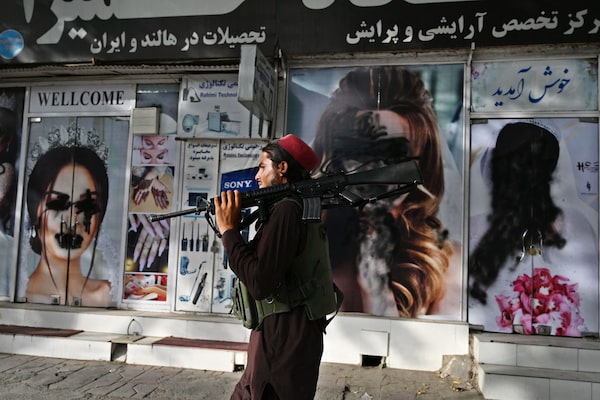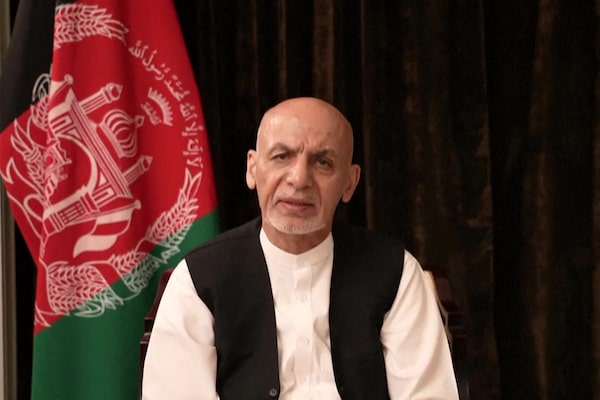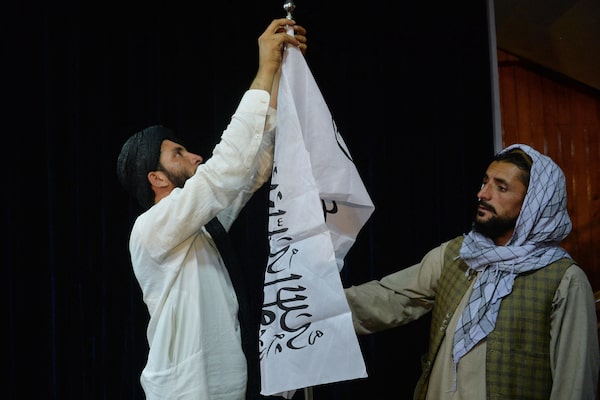
A Taliban fighter walks past shops with images of women that have been sprayed over in Shar-e-Naw in Kabul on Aug. 18.WAKIL KOHSAR/AFP/Getty Images
At least three people were killed in anti-Taliban protests in the Afghan city of Jalalabad on Wednesday, witnesses said, as the Islamist group moved to consolidate power and Western countries ramped up evacuations from a chaotic Kabul airport.
Thousands of people are trying to flee the country, fearing a return to the austere interpretation of Islamic law imposed during the previous Taliban rule that ended 20 years ago.
The Taliban have taken control of Afghanistan again. How did we get here?
Witnesses said armed members of the Taliban were preventing people from getting into the airport compound, including those with the necessary documents to travel.
“It’s a complete disaster. The Taliban were firing into the air, pushing people, beating them with AK47s,” said one person who was trying to get through.
A Taliban official said commanders and soldiers had fired into the air to disperse crowds outside Kabul airport, but told Reuters: “We have no intention to injure anyone.”
U.S. officials have told the Taliban “that we expect them to allow all American citizens, all third-country nationals, and all Afghans who wish to leave to do so safely and without harassment,” U.S. Deputy Secretary of State Wendy Sherman told reporters in Washington.
But the 4,500 U.S. troops in Kabul cannot help bring people to the airport for evacuation because they are focused on securing the airfield, U.S. Defense Secretary Lloyd Austin told a Washington news conference, acknowledging that evacuations had not reached targets.
General Mark Milley, chairman of the U.S. Joint Chiefs of Staff, said security at the Kabul airport was stable and the Taliban were not interfering with U.S. military operations.
Foreign ministers of the Group of Seven nations are due to discuss the evacuation effort and seek to coordinate flights at a virtual meeting on Thursday, German Foreign Minister Heiko Maas said.
A woman clutches her purse outside the airport in Kabul on Aug. 16. Afghan women who worked with the U.S. or international groups are frantically erasing any trace of those links for fear they will be targeted by the Taliban.JIM HUYLEBROEK/The New York Times News Service
Some 150 kilometres east of the capital in Jalalabad, protests against the Taliban provided an early test of the group’s promise of peaceful rule.
After seizing power over the weekend, the Taliban said they would not take revenge against old enemies and would respect the rights of women within the framework of Islamic law.
Two witnesses and a former police official told Reuters that Taliban fighters opened fire when residents tried to install Afghanistan’s national flag at a square in the city, killing three and injuring more than a dozen.
Taliban spokespeople could not be reached for comment.

An image grab taken from a recorded video message broadcast on the Facebook page of Afghan President Ashraf Ghani on Aug. 18. Mr. Ghani made his first appearance since leaving Kabul as the Taliban encircled the capital.-/AFP/Getty Images
NOT A DEMOCRACY
A new government to replace that of President Ashraf Ghani, who is in exile in the United Arab Emirates, may take the form of a ruling council, with Taliban supreme leader Haibatullah Akhundzada in overall charge, a senior member of the group said.
But Afghanistan would not be a democracy. “It is sharia law and that is it,” Waheedullah Hashimi told Reuters.
Ghani, who has been bitterly criticized by former ministers for leaving Afghanistan as Taliban forces swept into Kabul on Sunday, said he had followed the advice of government officials. He denied reports he took large sums of money with him.

Taliban fighters patrol in the Wazir Akbar Khan neighbourhood in Kabul, Afghanistan, on Aug. 18. The Taliban declared an 'amnesty' across Afghanistan and urged women to join their government Tuesday, seeking to convince a wary population that they have changed a day after deadly chaos gripped the main airport as desperate crowds tried to flee the country.Rahmat Gul/The Associated Press
“If I had stayed, I would be witnessing bloodshed in Kabul,” Ghani said in a video streamed on Facebook, his first public comments since it was confirmed he was in the UAE.
About 5,000 diplomats, security staff, aid workers and Afghans have been evacuated from Kabul in the past 24 hours and military flights will continue around the clock, a Western official told Reuters.
“Everyone wants out,” said a member of an Afghan family after they arrived in Germany. “Every day is worse than the day before. We saved ourselves but we couldn’t rescue our families.”
The Taliban have suggested they will impose their laws less severely than during their former rule, and a senior official said on Wednesday that the group’s leaders would be less reclusive than in the past.
“Slowly, gradually, the world will see all our leaders,” the senior Taliban official told Reuters.

Taliban officials adjust the Taliban flag before a press conference by Taliban spokesperson Zabihullah Mujahid in Kabul on Aug. 17.HOSHANG HASHIMI/AFP/Getty Images
‘DEEDS NOT WORDS’
Hashimi, who has access to the Taliban’s decision-making, said the role of women, including their right to work and education and how they should dress, would ultimately be decided by a council of Islamic scholars.
“They will decide whether they should wear hijab, burqa, or only (a) veil plus abaya or something, or not. That is up to them,” he told Reuters.
Under the Taliban’s 1996-2001 rule, women were prevented from working, girls were not allowed to go to school and women had to wear all-enveloping burqas to go out.
Echoing comments by world leaders, British Prime Minister Boris Johnson said the Taliban would be judged “by its actions rather than by its words.”
Many Afghans are skeptical of the Taliban promises.
“My family lived under the Taliban and maybe they really want to change or have changed, but only time will tell and it’s going to become clear very soon,” said Ferishta Karimi, who runs a tailoring shop for women.
Groups gathered at the international airport in Kabul, Afghanistan, looking to leave the country on Aug. 16, after the Taliban took control of the country.JIM HUYLEBROEK/The New York Times News Service
The Taliban seized Kabul on Sunday as Western forces withdrew under a deal that included a Taliban promise not to attack them as they leave.
U.S. President Joe Biden has faced a barrage of criticism about the withdrawal, including from British lawmakers on Wednesday who called Afghanistan’s collapse into Taliban hands a failure of intelligence, leadership and moral duty.
Biden has said he had to decide between asking U.S. forces to fight endlessly or follow through on the withdrawal deal of his predecessor, Donald Trump.
U.S. Senate Republican leader Mitch McConnell, during an appearance in his home state of Kentucky, pledged to keep the “heat” on Biden to rescue U.S. allies in Afghanistan and said Congress would consider allocating more money to help if needed.
He also dismissed the idea of a “new” Taliban, calling the militants “barbarians.”
Our Morning Update and Evening Update newsletters are written by Globe editors, giving you a concise summary of the day’s most important headlines. Sign up today.